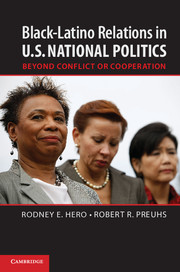Book contents
- Frontmatter
- Contents
- List of Tables and Figures
- Preface
- Acknowledgments
- Abbreviations
- 1 Introduction
- 2 What Previous Research Tells Us about Black-Latino Relations
- 3 Black-Latino Relations in Congressional Testimony and the Legal Arena
- 4 Salience and Congruence in Policy Positions
- 5 Black-Latino Relations in the U.S. House of Representatives
- 6 The Role of Group Interests and Ideology in Cross-Group Support
- 7 Further Explorations of Black-Latino Relations and Policies in National Politics
- 8 Conclusions
- Bibliography
- Index
8 - Conclusions
Published online by Cambridge University Press: 05 February 2013
- Frontmatter
- Contents
- List of Tables and Figures
- Preface
- Acknowledgments
- Abbreviations
- 1 Introduction
- 2 What Previous Research Tells Us about Black-Latino Relations
- 3 Black-Latino Relations in Congressional Testimony and the Legal Arena
- 4 Salience and Congruence in Policy Positions
- 5 Black-Latino Relations in the U.S. House of Representatives
- 6 The Role of Group Interests and Ideology in Cross-Group Support
- 7 Further Explorations of Black-Latino Relations and Policies in National Politics
- 8 Conclusions
- Bibliography
- Index
Summary
Historically distinct and ongoing social and demographic developments in America, particularly pronounced during the last third of the twentieth and the early twenty-first centuries, are altering the larger polity. While the color line between whites and blacks has been and remains fundamentally significant to the American experience, dimensions of racial/ethnic relations have emerged that bring important additional variation and complication to intergroup relations in American racial politics. A demographic transformation combined with formal equality has emerged from the civil rights era, yet continuing high racial/ethnic economic disparity raises an array of questions and has numerous implications for the political system. One major implication of this social change is that relations between Latinos and blacks – the two largest minorities – have grown in importance and constitute a significant dimension of American politics. Black-Latino relations will play a pivotal role in affecting and being affected by America’s racial/ethnic interminority as well as minority/nonminority politics, and interclass politics, more generally.
At the same time, these issues are part of larger arguments about pluralism as a description of and prescription for democracy in the United States in that competition or coalition across numerous groups is an important part of pluralism’s analytical emphasis. Assembling and integrating a wide array of evidence, we focused on a significant though largely neglected sphere of black-Latino political relations, the national government arena, which is a distinct part of and access point in the American political system. Our central empirical findings that there is little or no conflict and considerable evidence of independence between blacks and Latinos may be surprising, given what other research (on urban politics and mass attitudes) has found and impressions might lead us to expect. We believe these findings are significant in themselves, and had we done only this, our study would have made a notable contribution as an untold story in black-Latino relations and American politics more generally.
- Type
- Chapter
- Information
- Black–Latino Relations in U.S. National PoliticsBeyond Conflict or Cooperation, pp. 214 - 230Publisher: Cambridge University PressPrint publication year: 2013



